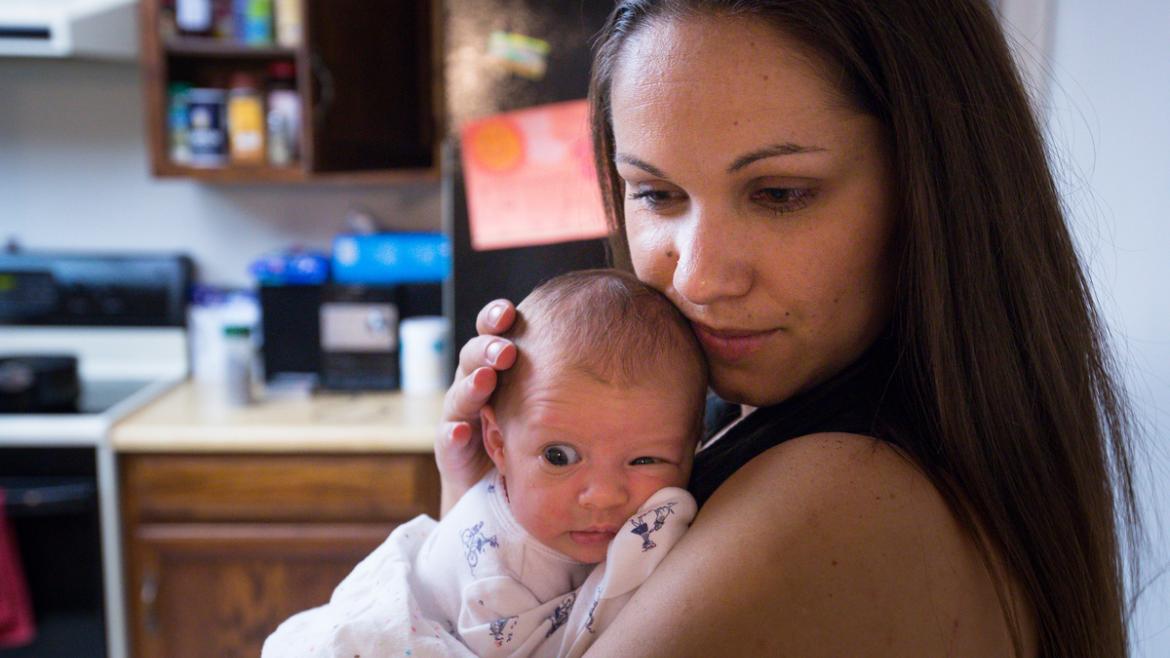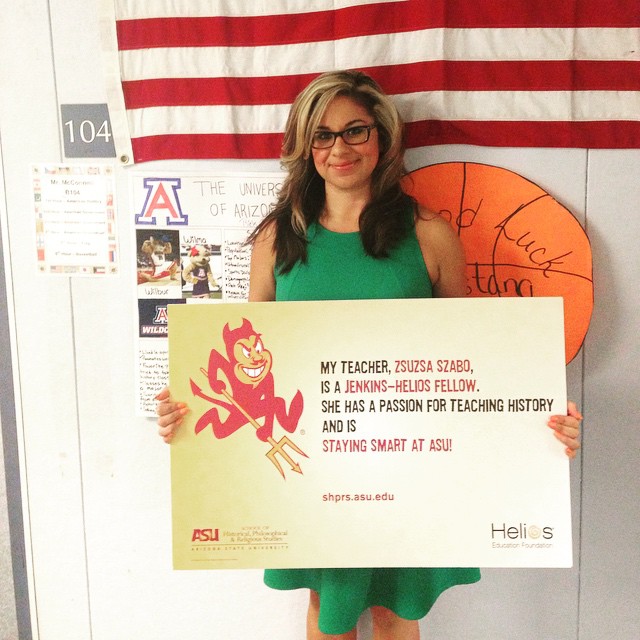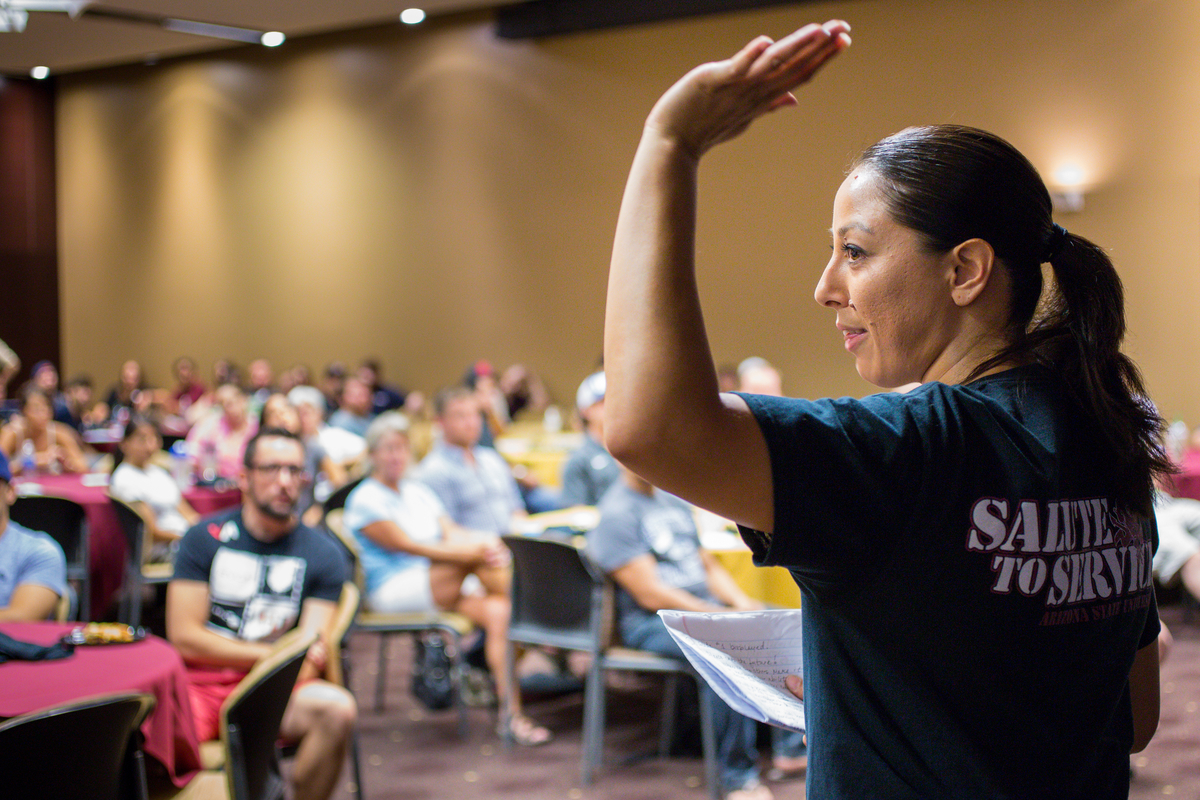Editor's note: This feature is part of a series profiling different slices of ASU's diverse population. Find more stories here.
They were responsible for other people’s lives, sometimes while under enemy fire. And then, in a flash, they’re sitting in classrooms watching other students text while professors are talking.
Arizona State University has about 3,400 students who are military veterans — a population that has unique challenges and advantages.
For many, the transition from military life to campus is abrupt, with some veterans starting classes just weeks after becoming civilians.
Some take full course loads while dealing with the emotional and physical scars of battle. Others spend their evenings changing diapers instead of socializing. They can face insensitive questions about their service. The throngs of people can be overwhelming.
“It’s culture shock,” said Joanna Sweatt, military/veteran advocate at ASU. She and her staff give academic and career advice and get veterans the services they need, such as counseling, support groups and tutoring.
Their work seems to be helping. ASU was named a “Military Friendly School for 2015” by G.I. Jobs magazine for the sixth consecutive year and was ranked as the No. 2 "Best College for Veterans" by College Factual.
Sweatt also provides emotional support.

Kayla Colon holds her 3.5-week-old daughter Tatiana Sophia Colon, as her husband prepares dinner for the family at their Chandler home.
Charlie Leight/ASU Now
“I have to get them to communicate, and help them get over what their ideas are of the outside world,” said Sweatt, who was in the Marine Corps for nine years. “Like, now there’s no one telling them what to do. Their time is their own to manage.”
While 85 percent of the veterans have college credits when they arrive at ASU, the move to campus life is still an adjustment.
“In Tempe, they can be in a lecture hall with 250 students who are cooking away on social media, and that can be distressful to a veteran, who is used to a situation where when you’re in someone’s presence, you give them your attention,” Sweatt said.
She said that although the veterans can face challenges, they also can draw on the discipline and leadership skills they built in the military.
“They bring real-world experience to the classroom and they don’t want to do poorly,” Sweatt said.
“It’s our job to show them they’re welcome here and that they deserve a college experience.”
From fighter jets to full-time student
When she was in the Navy, Kayla Colon launched fighter jets off the deck of aircraft carriers.
“I loved the adrenaline rush. I loved the thrill. I loved the smell of jet fuel. I loved the flight deck,” she said. “It was everything I wanted.”
Colon always was a go-getter.
She graduated a year early from Sequoia Charter School in Mesa and joined the Navy at age 17, eventually serving on the USS Theodore Roosevelt and the USS Harry S. Truman aircraft carriers.
During her second deployment, she met her husband and had a daughter.
“I decided I didn’t want to be away from her, so I needed to make the transition to being a civilian,” Colon said.
She left the Navy in June 2014 and started full time at ASU two months later, majoring in tourism development and management at the Downtown Phoenix campus.
“I am very structured, very organized. We have a system and a routine. We do things a certain way to make our lives work,” said Colon, who is 24. She expects to graduate next year, earning her degree in three years.
That organizational quality has served her well as Colon juggles a full class load with parenthood. Her husband works full time and is taking classes at Mesa Community College.
“But it’s a different mindset being around younger students who don’t have children and don’t have the responsibilities. They might work a part-time job to pay for their outings,” she said.
“I have different motivations … I look at my kids and think ‘this is why I’m doing this.’ ”
Still, the transition into civilian and student life didn’t come without challenges.
“I had a panic attack on my first day of classes,” she said. “There were so many people and it was overwhelming. I hadn’t been to school for six years.”
The support she’s received through the Student Veterans Club and with Sweatt has helped ease the change.
Last year, Colon, who wants to be a corporate event planner, organized family activities for the club. That camaraderie has helped sustain her through the tough times.
“Being a veteran comes with its own issues and being a veteran with a family has its own issues that not everybody can understand.”
Perhaps nothing shows Colon’s grit more than her most recent achievement: She gave birth to her second daughter on Friday, Sept. 11.
By the following Monday she was back in class.
Zsuzsa Szabo holding a sign made for her by her students.
The uninformed questions
Like many veterans, Zsuzsa Szabo’s parents inspired her to pursue military service.
But not because they were veterans.
“Both of my parents are immigrants and I grew up with the ‘America is the best country’ viewpoint and I always wanted to give back in some way,” she said.
After graduating from Westwood High School in Mesa, Szabo attended Mesa Community College for a year and then joined the Air Force on the advice of her sisters — who had been in the Army.
At Scott Air Force Base in Illinois, she worked handling medical records at a hospital.
“It was the best experience I ever had — besides ASU,” Szabo said.
Though she loved the Air Force, Szabo wanted to fulfill her dream of being a teacher, and so she came to ASU as an undergraduate in 2011. Getting a work-study job at the Pat Tillman Veterans Center helped ease her transition from airman to student.
“The environment and the camaraderie and getting to be with other veterans who are going to school is a great experience,” she said.
After graduating, Szabo landed her dream job — teaching history at Dobson High School in Mesa, where she shared her life experiences with the teenagers.
“When we got to current events and we were talking about the war on terrorism, I was able to bring a unique perspective to it,” she said.
Last year, she decided to return to ASU for her master’s degree in history. As a graduate student, Szabo, 31, still checks in with the Pat Tillman Center.
“I missed it so much and I still visit when I can,” she said.
Like many veterans on campus, Szabo has faced some uninformed questions.
“Always, with the Air Force, it’s whether I flew a plane. They think everyone was a pilot.
“Or, ‘Did you kill anybody?’ My students in high school asked that too,” said Szabo, who hopes to resume teaching when she completes her masters.
“Some people don’t have any clue about the military – just what they’ve seen on TV and in the movies, so I’m happy to answer their questions.”
Military Veteran Advocate Joanna Sweatt talks to academically transitioning veterans at the Veterans Welcome Orientation in ASU
Getting the right advice
Part of the transition from military life to student status includes paperwork, and the details about different benefits can get complicated.
That’s where Alan Phan can help.
Phan is one of the student workers at the Pat Tillman Center. A global studies major, he spent nearly four years in the Marine Corps, which he chose because it was the “toughest” branch of the military.
“I wanted to challenge myself. I regretted it the second day I was in, but I got through it and survived and I’m OK now,” he said.
Phan was an aviation and maintenance administrator at Marine Corps Air Station Miramar in San Diego, describing his team’s responsibilities this way: “If the airplane crashes, it comes straight back to us.”
He decided to pursue civilian life so he could spend more time with his son, who’s now 6 years old.
Phan, 28, has a full course load and works 20 hours a week at the Pat Tillman Center, helping fellow veterans navigate the administration to access their benefits.
“The best thing we can do is give them the right advice and make sure the classes they take are going toward their major. If they don’t, the VA won’t pay for it,” he said. “If you change your major and those classes don’t transfer, those benefits are gone. It’s a lot of pressure.”
Phan, who hopes to work for a non-governmental organization, said the job has helped him adjust to life on a big college campus.
“With 18-year-olds or 19-year-olds, when we have conversations, it’s hard to relate to them,” he said. “A lot of the kids here, their parents are paying for it or they’re smart and they got scholarships.
“I wouldn’t be in college without the military.”
More Sun Devil community

ASU president connects with veterans during town hall
Arizona State University President Michael Crow shared his family’s military background, provided university updates and reaffirmed ASU’s commitment to military-affiliated students during a town hall…

Tested tips for taking exams
With May quickly approaching, many students are starting to prep for their most important tests of the year — final exams.Toni Miceli, the inaugural director of the bar exam success program at…

School of Transborder Studies celebrates 15th anniversary
During the summer before his freshman year at Arizona State University, Salvador Macias participated in the AGUILA Youth Leadership Institute, a college access organization designed to help young…




